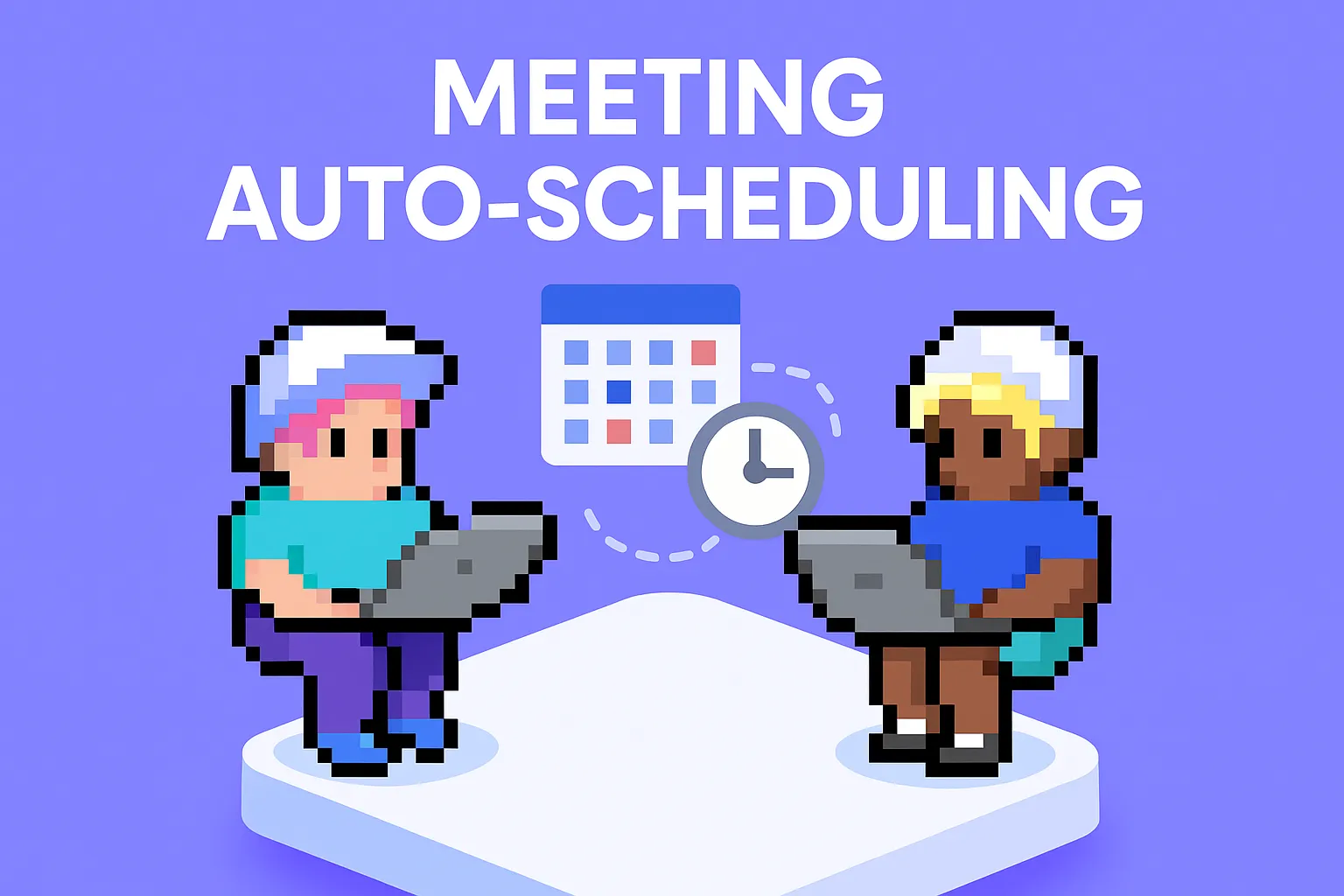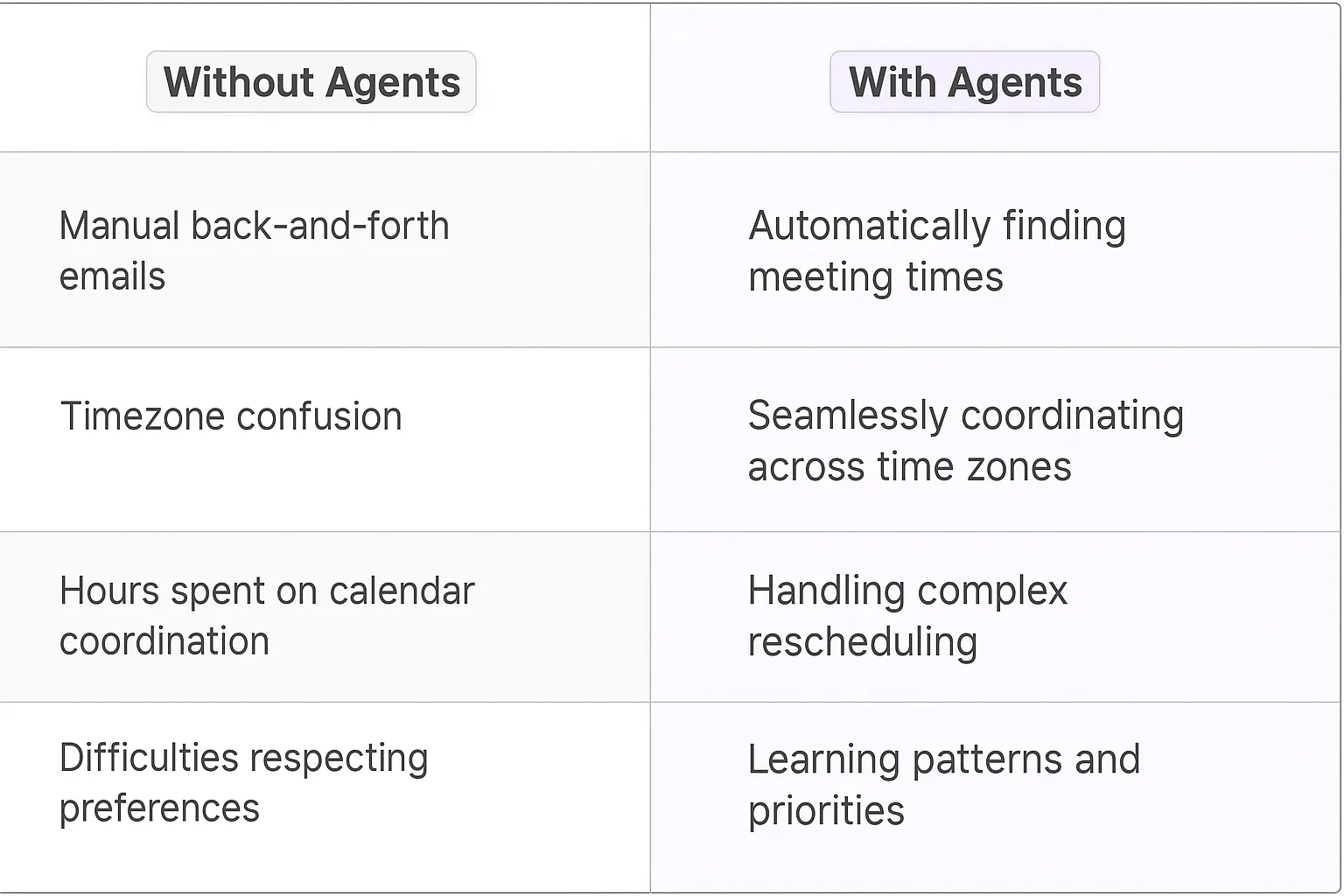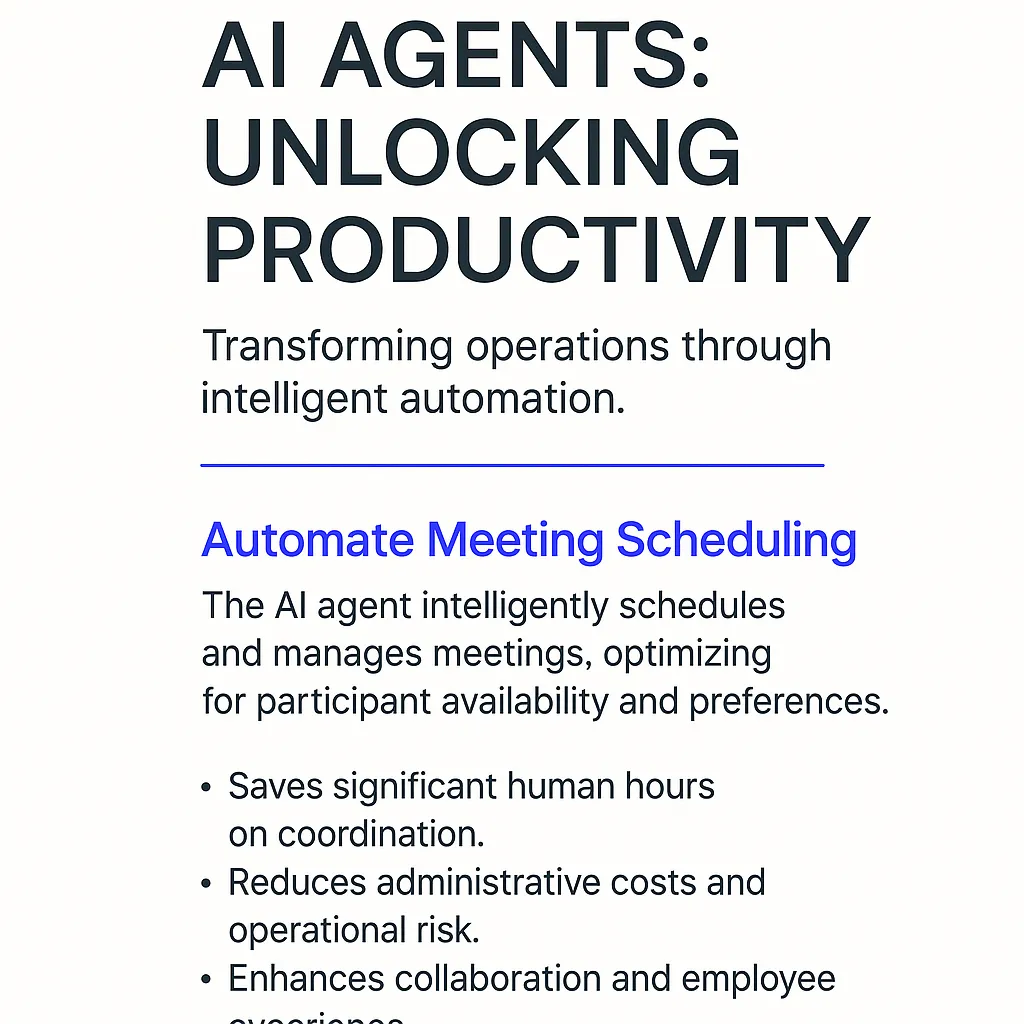Meeting Auto-Scheduling AI Agents
Understanding AI-Powered Meeting Coordination Systems
What is Meeting Auto-Scheduling?
Meeting auto-scheduling powered by AI agents is a sophisticated coordination system that autonomously manages the complex task of arranging meetings across teams, time zones, and organizations. Unlike traditional calendar tools, these digital teammates actively negotiate optimal meeting times by understanding context, preferences, and priorities. They process thousands of scheduling permutations in seconds while accounting for human factors like energy levels and focus time.
Key Features of Meeting Auto-Scheduling
- Natural language processing for understanding scheduling requests
- Multi-participant coordination across different time zones
- Learning capabilities that adapt to individual and team preferences
- Intelligent conflict resolution and rescheduling
- Priority-based scheduling that respects organizational hierarchy
- Buffer time management between meetings
- Integration with various calendar systems and meeting platforms

Benefits of AI Agents for Meeting Auto-Scheduling
What would have been used before AI Agents?
The traditional meeting scheduling dance was painful - we've all been there. You'd send an email suggesting times, wait for responses, realize someone's timezone was off, start over, and waste hours playing calendar Tetris. Some folks used basic scheduling tools that shared calendar links, but these still required manual back-and-forth and didn't handle the nuanced coordination that most meetings need.
Teams relied on dedicated executive assistants or operations staff to manage this complexity. But this created bottlenecks, was expensive to scale, and still resulted in scheduling conflicts and miscommunications.
What are the benefits of AI Agents?
AI-powered scheduling agents fundamentally change the game by bringing intelligence and autonomy to the process. They understand natural language, recognize context, and actively negotiate optimal meeting times across multiple participants.
The network effects are fascinating - as more people use these digital teammates for scheduling, the system gets smarter about everyone's preferences and constraints. An AI agent knows that Sarah prefers morning meetings, David needs buffer time between calls, and the team's energy peaks on Tuesdays.
The real magic happens when AI agents handle the edge cases that trip up traditional tools:- Rescheduling cascades when a key participant has to move a meeting- Finding slots that work across 5+ timezones while respecting everyone's working hours- Adapting to last-minute priority changes without creating new conflicts- Understanding which meetings can be batched together vs need spacing
From a growth perspective, this creates a powerful flywheel. Better scheduling → more productive meetings → increased adoption → more scheduling data → even better scheduling. The key insight is that AI agents aren't just automating an existing process - they're creating an entirely new system for coordination that wasn't possible before.
For scaling companies, this means being able to maintain the high-touch feel of having a professional executive assistant, while operating at a scale that would be impossible with human coordination alone. The ROI compounds as organizations grow more complex.

Potential Use Cases of Meeting Auto-Scheduling AI Agents
Processes
- Multi-timezone coordination for global teams - the AI agent analyzes team members' locations and working hours to find optimal meeting slots
- Complex scheduling patterns for recurring meetings with rotating attendees
- Managing meeting room and resource allocation across multiple office locations
- Automatic rescheduling when conflicts arise, with smart prioritization based on attendee seniority and meeting importance
- Calendar cleanup by identifying and resolving double-bookings
Tasks
- Sending personalized follow-up emails to confirm attendance
- Adding buffer time between meetings based on individual preferences
- Suggesting meeting duration based on agenda items and participant numbers
- Booking appropriate meeting rooms based on attendee count and tech requirements
- Setting up video conference links automatically based on team preferences
- Managing dietary preferences for meetings with catering
The Network Effects of AI Meeting Coordination
Meeting scheduling represents one of those deceptively complex coordination challenges that scales exponentially with team size. When you add one person to a team, you're not just adding one more calendar to juggle - you're multiplying the possible scheduling permutations.
AI meeting coordinators flip this complexity on its head. Instead of the traditional back-and-forth that burns productive hours, these digital teammates process thousands of calendar permutations in seconds. They learn from patterns: which team members frequently meet together, preferred meeting times, and how long similar meetings typically run.
The real power emerges when these AI agents start predicting needs before they arise. They'll notice that your weekly team sync always runs over when product specs are being reviewed, and automatically adjust future booking lengths. They'll recognize that Sarah is more responsive in morning meetings and John needs prep time after his regular client calls.
This isn't just about finding free slots in calendars - it's about understanding the human elements of meeting coordination and optimizing for team productivity and satisfaction. The best AI scheduling agents become invisible orchestrators of your team's time, turning what was once a daily frustration into a seamless background process.

Industry Use Cases
Meeting auto-scheduling AI agents represent one of those rare technological breakthroughs that create cascading positive effects across multiple industries. The impact goes far beyond simply putting meetings on calendars - these digital teammates fundamentally transform how organizations coordinate and collaborate.
What makes these AI agents particularly fascinating is how they adapt to industry-specific scheduling nuances. A sales team's meeting patterns look completely different from a healthcare provider's appointment flow, yet the core AI capabilities flex to handle both elegantly. The real magic happens when these agents learn the unwritten rules and preferences that make each industry unique.
Looking at concrete applications across sectors, we're seeing patterns emerge that highlight where meeting auto-scheduling creates the most value. The key isn't just automation - it's the combination of reducing cognitive load while simultaneously improving scheduling quality through machine learning. This creates compounding benefits as the AI gets smarter over time.
The following industry examples demonstrate how meeting auto-scheduling AI agents tackle distinct challenges while delivering measurable improvements in productivity and coordination. Each case reveals unique ways these digital teammates integrate into existing workflows while adapting to industry-specific requirements.
Meeting Auto-Scheduling in Healthcare: Solving the Patient Scheduling Crisis
Healthcare organizations face a massive coordination problem - getting the right doctors, specialists, and patients aligned for appointments while managing cancellations, emergencies, and complex scheduling constraints. The average medical practice loses $150,000 annually due to no-shows and scheduling inefficiencies.
Meeting auto-scheduling AI agents are transforming how healthcare providers handle this complexity. At NewYork-Presbyterian Hospital, an AI scheduling agent manages over 2,000 appointments daily across 40+ departments. The agent understands each doctor's availability, specialty, and location while factoring in patient preferences and medical urgency.
When a patient needs to see multiple specialists, the AI agent coordinates a sequence of appointments that minimizes hospital visits. It automatically adjusts the entire schedule when emergencies arise, prioritizing urgent cases while finding alternative slots for displaced appointments.
The results are compelling: 31% reduction in patient wait times, 22% decrease in no-shows, and 15% more patients seen per day. Medical staff report spending 60% less time on scheduling tasks. Most importantly, patients receive faster access to care - the AI finds appointment slots 3x faster than human schedulers.
This isn't just about efficiency gains. By removing scheduling friction, healthcare providers can focus on their core mission: delivering quality patient care. The AI becomes an invisible force multiplier, working behind the scenes to keep the complex healthcare machinery running smoothly.
The next frontier is predictive scheduling - AI agents that anticipate patient needs based on medical history and proactively suggest follow-up appointments. We're moving toward a future where scheduling friction disappears entirely from healthcare delivery.
Meeting Auto-Scheduling in Legal Services: Coordinating Complex Multi-Party Litigation
Law firms are drowning in scheduling complexity. A single class-action lawsuit can involve dozens of attorneys, expert witnesses, court reporters, and clients spread across multiple time zones. The traditional back-and-forth email chains for scheduling depositions and hearings waste hundreds of billable hours.
At Morrison & Foerster, an AI scheduling agent now manages the intricate dance of coordinating depositions for mass tort cases. The agent understands the availability of 200+ attorneys, tracks court filing deadlines, and factors in travel time between locations. It's particularly valuable for cases involving multiple jurisdictions where timing requirements vary by state.
The AI agent has learned the subtle patterns of legal scheduling - like avoiding Monday morning depositions for West Coast attorneys when dealing with East Coast courts, or clustering expert witness testimonies to minimize their travel overhead. When a key participant becomes unavailable, the agent rapidly reconfigures the entire deposition schedule while maintaining all procedural deadlines.
The numbers tell a compelling story: 47% reduction in scheduling-related delays, 28% decrease in canceled depositions, and an average of 12 hours saved per case in administrative overhead. Partners report being able to take on 20% more cases with the same support staff.
But the real magic happens in multi-district litigation (MDL) cases. The AI agent coordinates parallel depositions across different jurisdictions, ensuring no conflicts between related proceedings. It maintains a real-time map of all scheduled events, automatically adjusting when court dates shift or new parties join the case.
Looking ahead, we'll see AI agents that can predict scheduling conflicts before they occur by analyzing historical patterns and court calendars. The future of legal scheduling will be proactive rather than reactive, removing one more friction point from the practice of law.
Considerations & Challenges for Meeting Auto-Scheduling AI
Technical Challenges
Building effective meeting auto-scheduling AI requires navigating complex technical hurdles that many teams underestimate. Calendar systems often use different protocols and data formats - from Exchange to Google Calendar to custom enterprise solutions. The AI needs robust parsing capabilities to handle various time formats, timezone conversions, and recurring meeting patterns. A particularly thorny challenge lies in natural language processing - the AI must accurately interpret phrases like "let's meet next week" or "sometime after the quarterly review" while accounting for context.
Integration Complexity
Calendar access permissions present a significant barrier. The AI needs appropriate OAuth scopes and admin privileges to read and modify calendars. Enterprise security policies may restrict these permissions, requiring careful negotiation with IT teams. Additionally, the AI must gracefully handle scenarios where it can't access all attendees' calendars, perhaps falling back to email-based coordination.
Human Dynamics
Meeting scheduling isn't purely technical - it's deeply human. The AI needs to understand organizational hierarchy and meeting priority. A CEO's request likely takes precedence over a routine team sync. Cultural nuances matter too - some organizations expect instant responses while others have more relaxed communication norms. The AI must balance efficiency with social awareness.
Edge Cases
Real-world scheduling throws countless edge cases at the AI. What happens when someone's working hours aren't clearly defined? How should it handle last-minute cancellations or location changes? The AI needs sophisticated conflict resolution strategies for double-bookings and must gracefully manage failed scheduling attempts without creating endless email loops.
Privacy Considerations
Calendar data reveals sensitive information about business operations and personal schedules. The AI must implement robust data handling practices, potentially anonymizing certain details and respecting "private" calendar entries. Teams need clear policies about what information the AI can access and share, especially in organizations with strict compliance requirements.
The Future of Organizational Time Management
Meeting auto-scheduling AI agents represent a quantum leap forward in how organizations manage their most precious resource - time. The technology's ability to learn, adapt, and coordinate at scale creates compounding benefits that extend far beyond simple calendar management. As these systems continue to evolve, we're moving toward a future where scheduling friction disappears entirely, letting teams focus on what truly matters: doing great work together. The network effects and learning capabilities of these digital teammates suggest we're still in the early stages of understanding their full potential for transforming organizational coordination.













